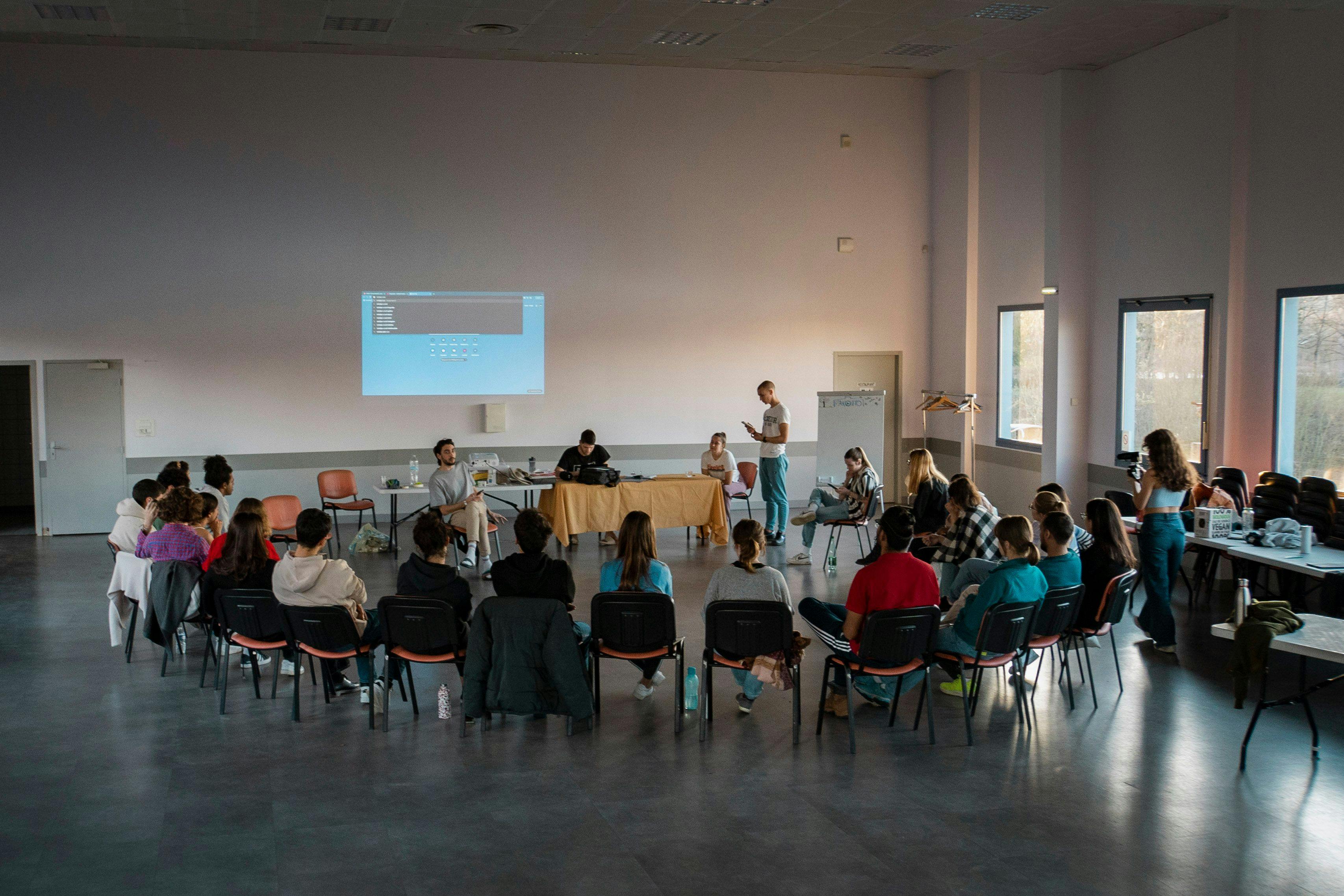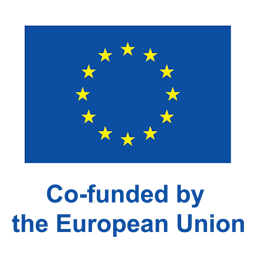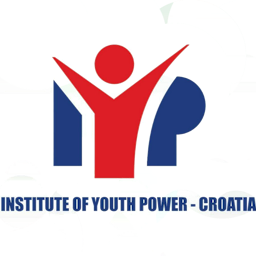Youth Exchange - Ecomedia Utopia

"Ecomedia utopia" was an Erasmus+ youth exchange aimed at raising awareness among young people about the impact of media on the environment, with a focus on three key aspects: the ecological footprint of media, environmental communication, and the mental footprint of media. The project brought together 31 participants from five different countries to promote critical thinking, civic engagement, and the search for ecological solutions while encouraging diversity and inclusion.
Objectives description
The Erasmus+ project "Ecomedia Utopia" had the primary goal of raising awareness and promoting critical reflection on the interaction between media and the environment. It revolved around three fundamental pillars:
1. Environmental Impact of Media: This dimension delved into the tangible consequences of media on our planet. It encompassed the extraction and manufacturing of our devices, reducing the carbon footprint associated with internet usage, and addressing the management of electronic waste.
2. Environmental Communication: This aspect focused on how the media approaches environmental issues, including its treatment of climate change. It also explored how the media influences our beliefs, promotes certain ideologies, all while highlighting the lack of self-critique within the media industry.
3. Mental Impact of Media: This facet examined how the digitization of our daily lives affects our physical and mental well-being, as well as our perception of the world around us.

The specific objectives of the "Ecomedia Utopia" project were diverse:
- Encourage critical thinking about the media's impact on the environment and climate change.
- Increase understanding of the ecological consequences of our media practices and device usage.
- Empower young people by equipping them with the skills needed to become agents of change.
- Highlight the potential of media to have a positive impact on the environment and communicate ecological solutions.
- Raise awareness about the environmental implications of daily media practices.
- Create videos that illustrate the concept of ecomedia.
- Develop a set of best practices for ecomedia.
- Introduce the concept of digital mindfulness and digital detox.
- Promote utopian thinking to reduce eco-anxiety and encourage civic engagement for a better future.
- Foster intercultural learning and exchanges, as well as active citizenship and social inclusion.
- Promote European values and the development of non-technical skills.
- Advocate for the Erasmus+ program and its opportunities.Activities
This project featured a youth exchange activity that brought together 31 participants from 5 different organizations representing the following countries: France, Spain, Croatia, Germany, and Italy, held in Laroin (Pau) for 10 days.
The project involved seventeen young individuals facing fewer opportunities. Their involvement was instrumental in sparking debates that led to a genuine assessment of issues and needs, often perceived differently within the same country or geographic region. We had agreed with our partners that, in selecting participants, priority would be given to those facing economic, geographic, or social obstacles.
All participants were required to have at least a basic knowledge of English, but mastery of the language was not necessary. They were expected to be open-minded and motivated to learn more about the project's topic and eager to experience intercultural exchange. All participants were between the ages of 18 and 30.
The youth exchange took place from February 14th to February 23rd, 2023, at the Iktus camping site in Laroin. Activities were conducted in the camping site's multifunctional hall located by the lake, as well as in the surrounding green spaces. They followed a methodology of non-formal education and included team-building activities, role-playing games, debates, creative workshops, meditation, theater, excursions, moments of reflection and evaluation (both personal and activity-related), screenings, presentations, and more.
Some of the specific methodologies used included:
- "learning by doing" for continuous self-assessment of skills and feedback among participants;
- "peer to peer" to directly share various experiences, promote learning among participants, and enhance intercultural communication and teamwork;
- visual and digital learning.The complete program of exchange activities can be found in the attached document.
DOWNLOADABLE DOCUMENTS
Results of the project
The specific outcomes of this project encompass the videos created by the participants during the mobility, which are accessible on our YouTube channel (see the link below). Additionally, a booklet on ecological footprint, ecological mental footprint, and environmental communication has been produced. It is also available in the downloadable documents below.
The project had a significant impact on the participants at various levels. Their participation represented both a personal challenge and a valuable learning opportunity, enabling them to:
- Acquire communication and interaction skills with individuals from international backgrounds.
- Learn to collaborate within groups in an unfamiliar context.
- Master communication in English, as well as other languages and non-verbal communication.
- Develop a better mutual understanding and a stronger spirit of cooperation among participants.
- Improve their adaptability in unfamiliar environments.
- Cultivate skills to critically address the relationship between media and the environment, while seeking solutions to these issues.
- Understand the environmental impact of media and promote responsible consumption.
- Decode media codes to effectively communicate about the environment.
- Reflect on the consequences of excessive media consumption on their physical and mental health.Following the conclusion of this project, the young participants remained in contact with each other and strengthened their sense of belonging to Europe. This learning experience extended beyond the 10 days of the exchange, leaving a lasting impact.
Likewise, the partner organizations were able to:
- Expand their knowledge and skills in the field of ecomedia.
- Enhance their capacity to develop similar projects, giving rise to numerous other potential proposals or projects stemming from this partnership.
- Improve their critical thinking when sharing media content.
- Increase their proficiency in environmental communication.
- Extend their network of international partners.
- Fine-tune their management of European projects.
- Adapt their work methods by incorporating digital communication as an effective tool for influencing social change.
- Strengthen their connections with their local communities (through the local dissemination event).Furthermore, this project provided local initiatives involved with an opportunity to explore the possibilities offered by the Erasmus+ program and European projects, even if they were not previously familiar with these domains.
External links
DOWNLOADABLE DOCUMENTS
Follow-up
During the follow-up phase, we granted all participants the freedom to undertake dissemination actions that they deemed most appropriate based on their local reality and target audience. Consequently, the target audience varies from one activity to another.
Concerning Rakonto, we organized a day of non-formal education with a 4th-grade class from the Serres-Castet college (see photos below). The primary objective of the activities conducted during this day was to raise awareness among teenagers about the role of media in combating climate change. We implemented activities aimed at understanding how to convey a message or tell a story through images and audiovisual content. Discussions were initiated about the importance of highlighting solutions to current issues through media. Obviously, this day primarily served as an introduction to the topic and as awareness-building for young adolescents.
Additionally, the Spanish association recorded a podcast in which participants analyzed the film "Neptune" from an ecological perspective. This activity was mainly intended for a more mature audience interested in delving into the relationship between ecology and cinema. The Croatian, German, and Italian associations chose to share the reflections that emerged during the mobility by writing articles for their target audience, which typically consists of young adults interested in environmental and societal issues, eager to learn more on the subject. All these results are available through the provided links or downloadable documents.
To conclude, we marked the project's conclusion with an online "premiere" of the video created with the participants' involvement. Emboldened by the success of this project, we have decided to launch a new Erasmus+ project in 2024, focused on utopian thinking, which will address the theme of ecomedia and go beyond it.
DOWNLOADABLE DOCUMENTS
Critical Thinking
|Environment
|Audiovisual
|





